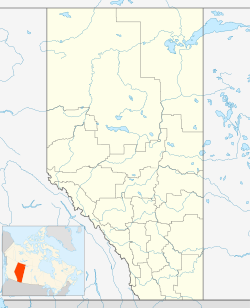Two Hills, Alberta
| Two Hills | |
|---|---|
| Town | |
| Town of Two Hills | |
| Motto: Small Town With A Big Future | |
| Location of Two Hills in Alberta | |
| Coordinates: 53°42′54″N 111°44′46″W / 53.71500°N 111.74611°WCoordinates: 53°42′54″N 111°44′46″W / 53.71500°N 111.74611°W | |
| Country |
|
| Province |
|
| Region | Central Alberta |
| Census division | 10 |
| Municipal district | County of Two Hills No. 21 |
| Incorporated | |
| • Village | June 4, 1929 |
| • Town | January 1, 1955 |
| Government | |
| • Mayor | Arnold Romaniuk |
| • Governing body | Two Hills Town Council |
| Area (2016) | |
| • Land | 3.38 km2 (1.31 sq mi) |
| Elevation | 603 m (1,978 ft) |
| Population (2016) | |
| • Total | 1,352 |
| • Density | 400/km2 (1,000/sq mi) |
| Time zone | MST (UTC-7) |
| Postal code span | T0B 4K0 |
| Area code(s) | +1-780 |
| Highways |
Highway 36 Highway 45 |
| Waterway | Vermilion River |
| Website | Official website |
Two Hills is a town in central Alberta, Canada. It is located approximately 137 km (85 mi) east of Edmonton at the junction of Highway 45 and Highway 36. Two Hills is primarily an agriculture-based community.
In the 2016 Census of Population conducted by Statistics Canada, the Town of Two Hills recorded a population of 1,352 living in 399 of its 478 total private dwellings, a −2% change from its 2011 population of 1,379. With a land area of 3.38 km2 (1.31 sq mi), it had a population density of 400.0/km2 (1,036.0/sq mi) in 2016.
The Town of Two Hills' 2012 municipal census counted a population of 1,431, a 13.9% increase over its 2007 municipal census population of 1,232.
In the 2011 Census, the Town of Two Hills had a population of 1,379 living in 472 of its 522 total dwellings, a 31.7% change from its 2006 population of 1,047. With a land area of 3.31 km2 (1.28 sq mi), it had a population density of 416.6/km2 (1,079.0/sq mi) in 2011.
In 2006, Two Hills had a population of 1,047 living in 499 dwellings, a 4.0% decrease from 2001. The town has a land area of 3.31 km2 (1.28 sq mi) and a population density of 316.1/km2 (819/sq mi).
The community consists of mainly residents of Ukrainian descent. In recent years, an influx of German speaking Mennonites have started migrating from Mexico. The population grew enough to warrant the creation of a separate Mennonite school in 2006.
...
Wikipedia

